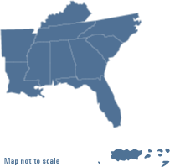Private Lands Program/Land Stewardship -- A Growing American Tradition
The Theodore Roosevelt National Wildlife Refuge Complex has an active private lands program that is funded through the Partners for Fish and Wildlife Program. The Partners Program works with private landowners, federal agencies, tribes, state and local governments, conservation organizations, academic institutions, businesses and industries, and school groups.
The Partners Program:
- Is voluntary
- Provides help to restore habitat on private and tribal lands
- Extends resources through partnerships
- Links public and private resources
To find out whether your project qualifies for financial and technical assistance, contact Bo_Olswanger@fws.gov.
You can learn more about the Partners Program at http://www.fws.gov/partners.
One of our current Partners Projects in Mississippi involves the Tchula Lake Watershed Restoration Project. We are working with a Task Force comprised of the City of Tchula; Holmes County Soil & Water Conservation District; Mississippi Department of Wildlife, Fisheries, and Parks; the Department of Environmental Quality; Corps of Engineers; Natural Resources Conservation Service and others to restore the 41-mile long Tchula Lake and surrounding watershed.
Our Partners Biologist also works with the Mississippi Partners
Program to provide pipe to private landowners so that they can
create habitat for wintering migratory waterfowl. Aquatic habitat
in agricultural fields during winter provides important food,
cover, and water for ducks traveling through the Mississippi
Flyway.
Many Partners Projects are located near National Wildlife Refuges
or State Wildlife Management Areas. Developing projects in close
proximity to existing valuable wildlife habitat multiplies the
benefits, and expands habitat for species that rely upon these
lands for survival.
National Wildlife Refuges and Land Stewardship - A Growing American Tradition
One hundred years after President Theodore Roosevelt acknowledged America’s deep commitment to the land at Pelican Island, the National Wildlife Refuge System continues the tradition.
But we’re not alone. Today, the National Wildlife Refuge System shares responsibility for managing fish and wildlife habitat with States, American citizens, non-government organizations, Native American tribes and other private groups. We value agreements and partnerships that work for the people, and for wildlife. Conservation is much more than the preservation of our natural heritage - it includes actively managing our wildlife populations and their habitats. Management tools used by biologists and private landowners include habitat restoration, prescribed burning, hunting, fishing, law enforcement, and reintroduction, to name a few.
Conservation Saves Wildlife and Serves Communities
Refuges value their partnerships with private landowners and
conservation groups. Cooperative conservation activities improve
and restore fish and wildlife habitat while providing tangible
products for local communities, and improving the overall quality
of life. Activities associated with outdoor recreation keep local
communities economically vibrant, and provide enjoyable opportunities
for the 82 million Americans who fished, hunted, or watched wildlife
in 2001, and in the process, spent over $108 billion.
Wildlife habitat conservation yields multiple benefits - wildlife
habitat for native species, economic boosts for local communities,
and opportunities for the millions of Americans who share a great
passion for outdoor recreation.
Of no less importance, conservation lands provide ecological services such as water filtration, carbon sequestration, and flood control. They also support populations of birds, bees, and other critters that pollinate our crops and native plants. While these ecological services are typically not paid for in dollars, they are essential to the economic health of the nation.
The National Wildlife Refuge System’s well cared-for habitat is available for public enjoyment, whether it is hunting, fishing, or simply connecting with our Nation’s outdoor treasures.
Since 1987, the Service's Partners for Fish and Wildlife Program has offered technical and financial assistance to help private landowners voluntarily restore wetlands and other fish and wildlife habitats on their land. Because more than 70 percent of our Nation's landscape is in private ownership, fish and wildlife populations depend on America’s private landowner. The National Wildlife Refuge System, along with the sons and daughters of America’s pioneer families, will continue the American tradition, working to conserve natural resources for our children, for recreation, for fish and wildlife, for all the right reasons. We’re in good company.
To find out whether your project qualifies for financial and technical assistance through the Partners for Fish and Wildlife Program, contact Bo_Olswanger@fws.gov.



